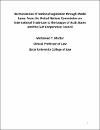Harmonization of National Legislation Through Model Laws: From the United Nations Commission on International Trade Law to the League of Arab States and the Gulf Cooperation Council
الملخص
In its productive efforts to remove barriers in international trade and reconcile
differences in legal systems, the United Nations Commission on International
Trade Law [UNCITRAL] adopts model laws that provide guidance for national
legislation in enacting new laws or amending and changing existing ones.
In the Arab region, the impact of the UNCITRAL Model law on international
Commercial arbitration, for instance, is a testimony to this success story.
In the meantime, the Arab countries have their own regional model laws that are
intended to achieve their goal in establishing a “close cooperation of the member
states… in… economic and financial matters including trade, customs, currency,
agriculture, and industry”, as stipulated in the charter of the league of the Arab
states.
This process started in 1981 with the famous Sanna Strategy, a great number of
model laws were drafted by the LAS that covered proof of civil and commercial
transactions through technology, civil law, combating cyber-crimes, human
trafficking and corruption, electronic commerce, legal aid, Arabic judiciary, among
others.
The Charter of the Gulf Cooperation council similarly states that it aims to
“formulate similar regulations in various fields including… economic and financial
affairs, commerce, customs and communications”.
More recently, the GCC adopted model laws on trademarks, regulations of the
financial markets, issuance of investment funds, combating dumping through
remedies and preventive measure and several others.
The purpose of this paper is to present the first comprehensive, although brief,
analysis of these model laws. I will examine the origin of the Arab model laws and
whether they rely on international standards including those embodied in the
works of the UNCITRAL. I will debate their impact on national legislation in Arab
laws and whether they provide guidance in drafting domestic laws irrespective of
their non-binding nature. I will argue that reforming and modernizing commercial
and trade laws in Arab legal systems are contingent upon learning from
comparative models and best global practices
معرّف المصادر الموحد
https://www.uncitral.org/pdf/english/congress/Papers_for_Programme/58-MATTAR-Harmonization_of_National_Legislation_through_Model_Laws.pdfDOI/handle
http://hdl.handle.net/10576/17674المجموعات
- أبحاث القانون [297 items ]


